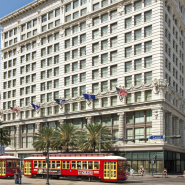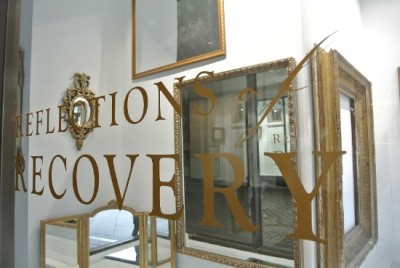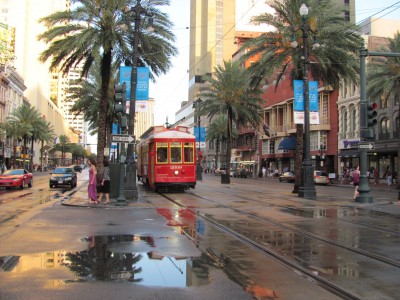 Ritz-Carlton, New Orleans
Ritz-Carlton, New Orleans
The Ritz-Carlton Resort of New Orleans is cementing itself as a community mainstay by commemorating the tenth anniversary of Hurricane Katrina with a new art installation.
Titled “Reflections on Recovery” and curated by local artist Kit Wohl, the display, which will be open to the public through October, is hosted in the hotel’s gallery space and consists of a number of mirrors that read “Reflections on Recovery” in gold decal. The installation therefore enshrines New Orleans residents and guests as crucial to the recovery effort and reminds the community how far it has come in the 10 years since the hurricane.
"The gallery facing Canal Street, the city's busiest thoroughfare and entrance into The Ritz-Carlton, New Orleans, is hung with mirrors, which reflects the commerce, restored buildings and passing traffic celebrating recovery from devastation," said Darren Crumpton, director of sales and marketing at Ritz-Carlton, New Orleans.
"New Orleanians and visitors both past and current daily contribute to cities robust energy," he said. "Not only did we rebuild, the city came back better than before. It created a template for reform and success embracing an entrepreneurial spirit that has spawned startups and attracted creative young minds."
Reflections on recovery
Reflections on Recovery is Ritz-Carlton’s latest showcase of its dedication to reinvesting in New Orleans in the aftermath of the most devastating natural disaster in the United States’ history. The hotel also partners with the St. Bernard Project to rebuild homes destroyed by Hurricane Katrina.
Rather than creating an elaborate exhibition, Ritz-Carlton and Ms. Wohl created a space for interaction and remembrance.
"Reflections on Recovery" gallery display
"What better than an installation of mirrors as plain and as fanciful as the city, as reflections of recovery?" Ms. Wohl asked in a statement. Her question emphasizes that Ritz-Carlton is creating a space for guests, locals and tourists to reflect on New Orleans’ recent history.
The installation turns the viewers into active participants, acknowleding the role of locals in cleaning up the city after Hurricane Katrina and allowing them to feel like part of the city and recovery effort rather than like bystanders or outsiders.
New Orleans, Canal Street
“We are well aware that none of this recovery could–or would–have happened without the help of hundreds of thousands of our fellow Americans who volunteered to help us clean up this once-awful mess and get about the business of living again in a city that lives loud, laughing and loving long into the night," said Chris Rose, a journalist who won a Pultizer covering the disaster in 2006 as part of the Times-Picayune and is cited in the press release as a major inspiration for the exhibit.
His comments, like the Reflections on Recovery installation, further illuminate the role of New Orleans population in the city’s recovery.
"When most of the residents were displaced, [Mr. Rose's] Times-Picayune columns filed online until the daily paper was publishing in print, gave us heart, laughter and tears when we all most needed them," Ms. Wohl said.
Hurricane Katrina aftermath
Despite Hurricane Katrina causing $108 billion of damage, New Orleans has reemerged as one of the U.S.' most visited cities, with a prominent music scene, free attractions, countless festivals and famous nightlife.
Ritz-Carlton's Reflections on Recovery offers both visitors and locals an opportunity to celebrate the city’s revitalization and remember the lives lost 10 years ago.
Local largesse
As consumers become increasingly concerned with a brand’s values, hotels must continue to make themselves a significant part of local communities, which Ritz-Carlton has previously taken steps to do.
In July 2014, for example, the Ritz-Carlton, Washington, invited guests to participate in its “Do Good, Feel Good” package to give back to the communities surrounding the hotel.
The package acquainted guests with the DC Central Kitchen, a community kitchen that helps feed low-income and at-risk neighborhoods of Washington. Luxury hotels have been responding to the growing interest in philanthropy travel with packages that include charity aspects (see story).
Other branches have taken up more general causes. Last October, The Ritz-Carlton San Francisco revitalized its National Breast Cancer Awareness Month activities with a number of offers.
Most notably, the property signaled its commitment to the cause by illuminating its exterior with pink lights. Beyond that display, guests were also able to purchase items that both spread awareness and helped fund the Breast Cancer Emergency Fund (see story).
"All of The Ritz-Carlton properties are active members in their communities, not only welcoming guests regionally and worldwide, but also being a major employer within the community," Ritz-Carlton's Mr. Crumpton said. "Embracing our city and becoming an active participant within the community is a part of our founding principles."
Final Take
Forrest Cardamenis, editorial assistant on Luxury Daily, New York



